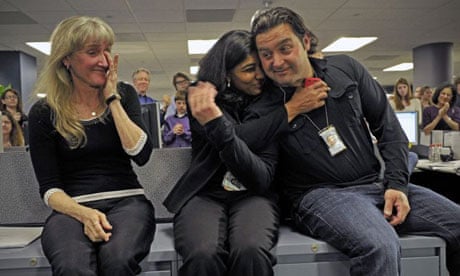For the first time in the history of the Pulitzer Prize – the highest honour in American journalism – the award has gone to a series of articles in an investigation that never appeared on the printed page.
ProPublica, the web-based independent investigative news organisation, was awarded a Pulitzer Prize for national reporting for its expose of dubious dealing on Wall Street leading up to the financial crisis, with the judges praising the way journalists Jesse Eisinger and Jake Bernstein used online tools "to help explain the complex subject to lay readers."
While ProPublica won its first Pulitzer Prize last year for an article that appeared in the New York Times Magazine – and split the award with the Los Angeles Times – this year it won the award outright for its series, The Wall Street Money Machine.
"We at ProPublica are delighted by this award, and deeply honoured," wrote the organisation's editor in chief, Paul Steiger, noting: "This year's prize is the first for a group of stories not published in print."
The ProPublica series included collaboration with NPR's Planet Money and This American Life programmes, but radio output is not eligible for the award under the Pulitzer criteria. Previous winners have included news agencies such as Reuters and the Associated Press, although their content generally also appears in print.
Among the other winners, the Los Angeles Times celebrated its recovery with two Pulitzers, one for Barbara Davidson's brilliant and haunting portraits of Los Angeles gang violence and the award for public service for its investigation into the unusually high salaries awarded to officials in the city of Bell in California, revealing how taxes in the small town were raised to pay for them.
The New York Times also won two Pulitzers, for international reporting and for commentary.
In a surprise move, the board administering the prize decided not to make an award in the breaking news category, for the first time since the prize was founded 95 years ago.
In the separate arts section of the award, Jennifer Egan won the Pulitzer Prize for fiction for A Visit from the Goon Squad.
The awards, winners and short-listed finalists, and judges comments:
Public service
The Los Angeles Times for its exposure of corruption in the small California city of Bell, where officials tapped the treasury to pay themselves exorbitant salaries, resulting in arrests and reforms.
Finalists: Bloomberg News for the work of Daniel Golden, John Hechinger and John Lauerman revealing how some for-profit colleges exploited low-income students, leading to a federal crackdown on a multi-billion-dollar industry; and the New York Times for the work of Alan Schwarz in illuminating the peril of concussions in football and other sports, spurring a national discussion and a re-examination of helmets and of medical and coaching practices.
Breaking news reporting
No award.
Finalists: Chicago Tribune staff for coverage of the deaths of two Chicago firefighters killed while searching for squatters in an abandoned burning building; the Miami Herald and El Nuevo Herald, a joint staff entry, for coverage of the Haitian earthquake, often working under extreme conditions; and the Staff of The Tennessean, Nashville, for coverage of the most devastating flood in the area's history.
Investigative reporting
Paige St John of the Sarasota Herald-Tribune, for her examination of weaknesses in the murky property-insurance system vital to Florida homeowners, providing handy data to assess insurer reliability and stirring regulatory action.
Finalists: Walt Bogdanich of the New York Times for his spotlighting of medical radiation errors that injure thousands of Americans, sparking national discussion and remedial steps; and Sam Roe and Jared S Hopkins of the Chicago Tribune for their investigation, in print and online, of 13 deaths at a home for severely disabled children and young adults, resulting in closure of the facility.
Explanatory reporting
Mark Johnson, Kathleen Gallagher, Gary Porter, Lou Saldivar and Alison Sherwood of the Milwaukee Journal Sentinel for their lucid examination of an epic effort to use genetic technology to save a four-year-old boy imperiled by a mysterious disease, told with words, graphics, videos and other images.
Finalists: the Wall Street Journal staff for its penetration of the shadowy world of fraud and abuse in Medicare, probing previously concealed government databases to identify millions of dollars in waste and corrupt practices; and the Washington Post staff for its exploration of how the military is using trauma surgery, brain science and other techniques both old and new to reduce fatalities among the wounded in warfare, telling the story with words, images and other tools.
Local reporting
Frank Main, Mark Konkol and John J Kim of the Chicago Sun-Times for their immersive documentation of violence in Chicago neighborhoods, probing the lives of victims, criminals and detectives as a widespread code of silence impedes solutions.
Finalists: Marshall Allen and Alex Richards of the Las Vegas Sun for their compelling reports on patients who suffered preventable injuries and other harm during hospital care, taking advantage of print and digital tools to drive home their findings; and Stanley Nelson of the Concordia Sentinel, a weekly, for his courageous and determined efforts to unravel a long forgotten Ku Klux Klan murder during the Civil Rights era.
National reporting

Jesse Eisinger and Jake Bernstein of ProPublica for their exposure of questionable practices on Wall Street that contributed to the nation's economic meltdown, using digital tools to help explain the complex subject to lay readers.
Finalists: David Evans of Bloomberg News for his revelations of how life insurance companies retained death benefits owed to families of military veterans and other Americans, leading to government investigations and remedial changes; and the Wall Street Journal Staff for its examination of the disastrous explosion on the Deepwater Horizon oil rig in the Gulf of Mexico, using detailed reports to hold government and major corporations accountable.
International reporting
Clifford J Levy and Ellen Barry of the New York Times for dogged reporting that put a human face on the faltering justice system in Russia, remarkably influencing the discussion inside the country.
Finalists: Deborah Sontag of the New York Times for her coverage of the earthquake in Haiti, steadfastly telling poignant, wide-ranging stories with a lyrical touch and an impressive eye for detail; and the Wall Street Journal staff for its examination of the causes of Europe's debt crisis, taking readers behind closed doors to meet pivotal characters while illuminating the wider economic, political and social reverberations.
Feature writing
Amy Ellis Nutt of the Star-Ledger, Newark, New Jersey, for her deeply probing story of the mysterious sinking of a commercial fishing boat in the Atlantic Ocean that drowned six men.
Finalists: Tony Bartelme of the Post and Courier, Charleston, South Carolina, for his engaging account of a South Carolina neurosurgeon's quest to teach brain surgery in Tanzania, possibly providing a new model for health care in developing countries; and Michael M Phillips, of the Wall Street Journal, for his portfolio of deftly written stories that provide war-weary readers with fresh perspective on the conflict in Afghanistan.
Commentary
David Leonhardt of the New York Times for his graceful penetration of America's complicated economic questions, from the federal budget deficit to health care reform.
Finalists: Phillip Morris of the Plain Dealer, Cleveland, for his blend of local storytelling and unpredictable opinions, enlarging the discussion of controversial issues that stir a big city; and Mary Schmich of the Chicago Tribune for her versatile columns exploring life and the concerns of a metropolis with whimsy and poignancy.
Criticism
Sebastian Smee of the Boston Globe for his vivid and exuberant writing about art, often bringing great works to life with love and appreciation.
Finalists: Jonathan Gold of the LA Weekly for his delightful, authoritative restaurant reviews, escorting readers through a city's diverse food culture; and Nicolai Ouroussoff of the New York Times for his well-honed architectural criticism, highlighted by ambitious essays on the burst of architectural projects in oil-rich Middle East countries.
Editorial writing
Joseph Rago of the Wall Street Journal for his editorials challenging the health care reform advocated by President Obama.
Finalists: Jackson Diehl of the Washington Post for his insightful editorials on foreign affairs, marked by prescient pieces critical of America's policy toward Egypt well before a revolution erupted there; and John McCormick of the Chicago Tribune for his relentless campaign to reform an unsustainable public pension system that threatens the economic future of Illinois.
Editorial cartooning
Mike Keefe of the Denver Post for his widely ranging cartoons that employ a loose, expressive style to send strong, witty messages.
Finalists: Matt Davies for cartoons in the Journal News, Westchester County, New York, work notably original in concept and execution, offering sharp opinion without shrillness; and Joel Pett of the Lexington Herald-Leader, for provocative cartoons that often tackle controversial Kentucky issues, marked by a simple style and a passion for humanity.
Breaking news photography
Carol Guzy, Nikki Kahn and Ricky Carioti of the Washington Post for their up-close portrait of grief and desperation after a catastrophic earthquake struck Haiti.
Finalists: Daniel Berehulak and Paula Bronstein of Getty Images for their compelling portrayal of the human will to survive as historic floods engulfed regions of Pakistan; and Carolyn Cole of the Los Angeles Times for her often haunting images of a massive oil spill in the Gulf of Mexico, capturing the harsh reality of widespread devastation.
Feature photography
Barbara Davidson of the Los Angeles Times for her intimate story of innocent victims trapped in the city's crossfire of deadly gang violence.
Finalists: Todd Heisler of the New York Times for his sensitive portrayal of a large Colombian clan carrying a genetic mutation that causes Alzheimer's disease in early middle age; and Greg Kahn of The Naples Daily News for his pictures that show the mixed impact of the recession in Florida – loss of jobs and homes for some but profit for others.
